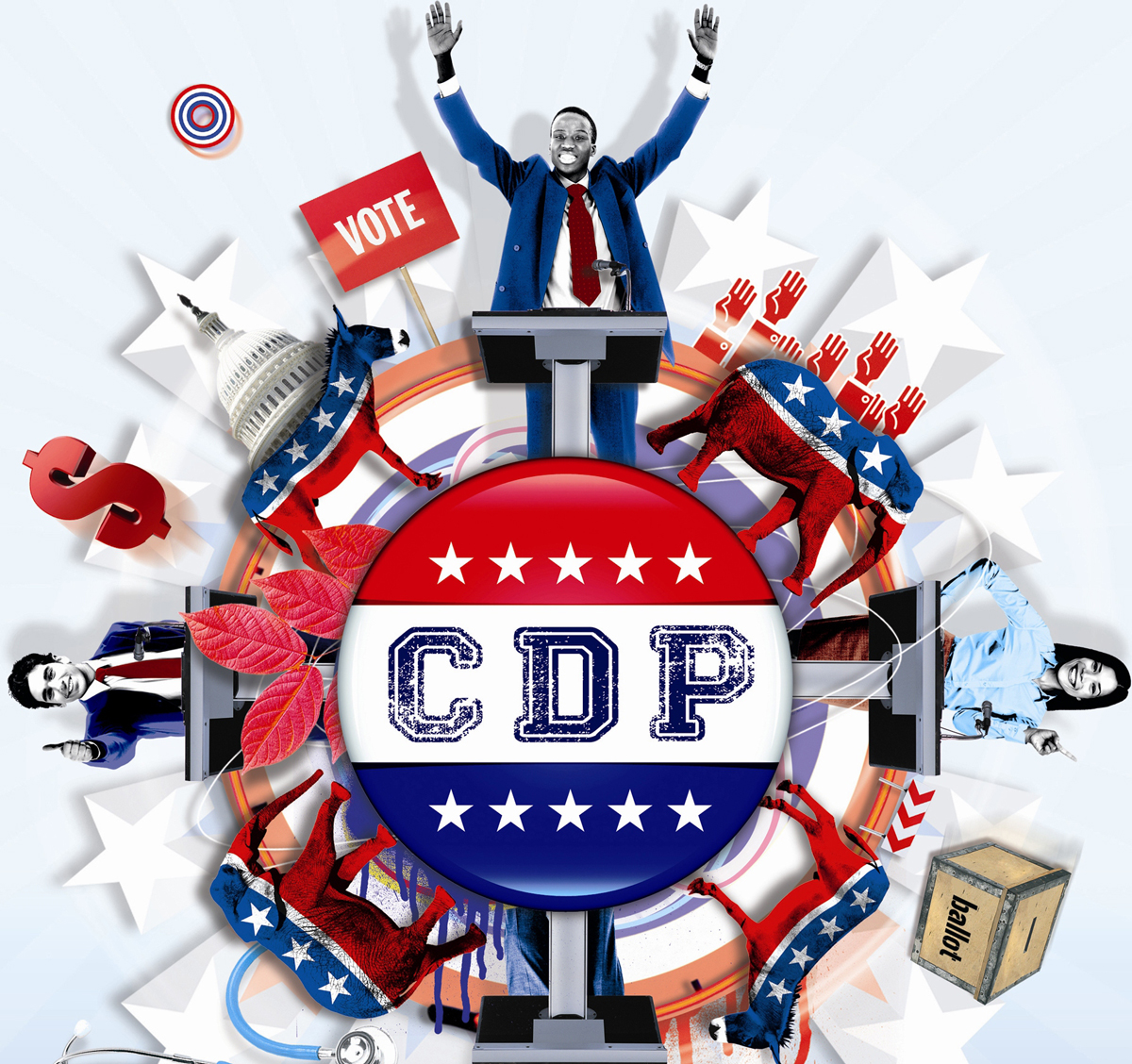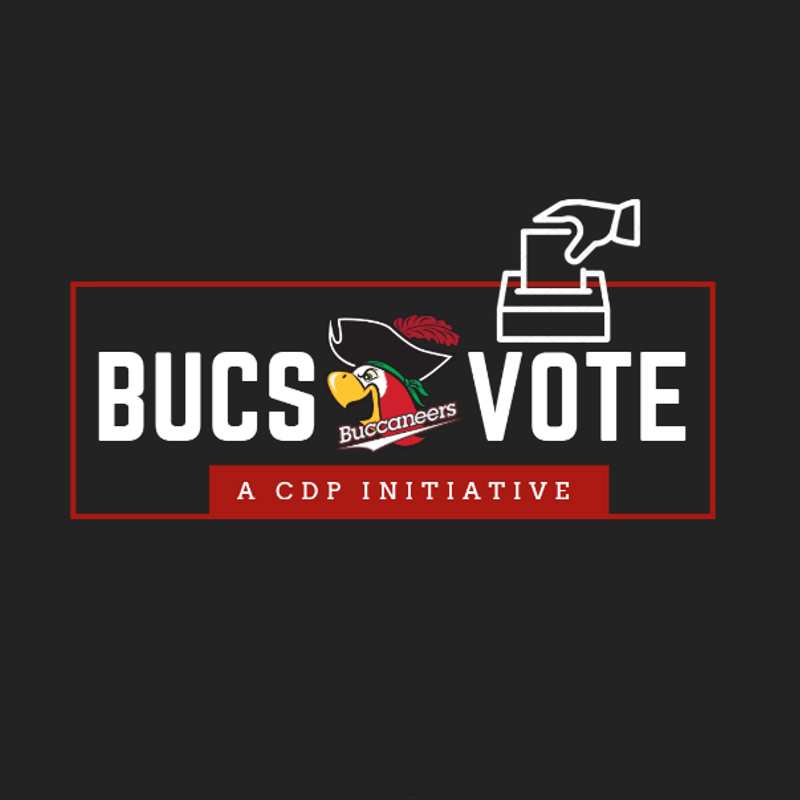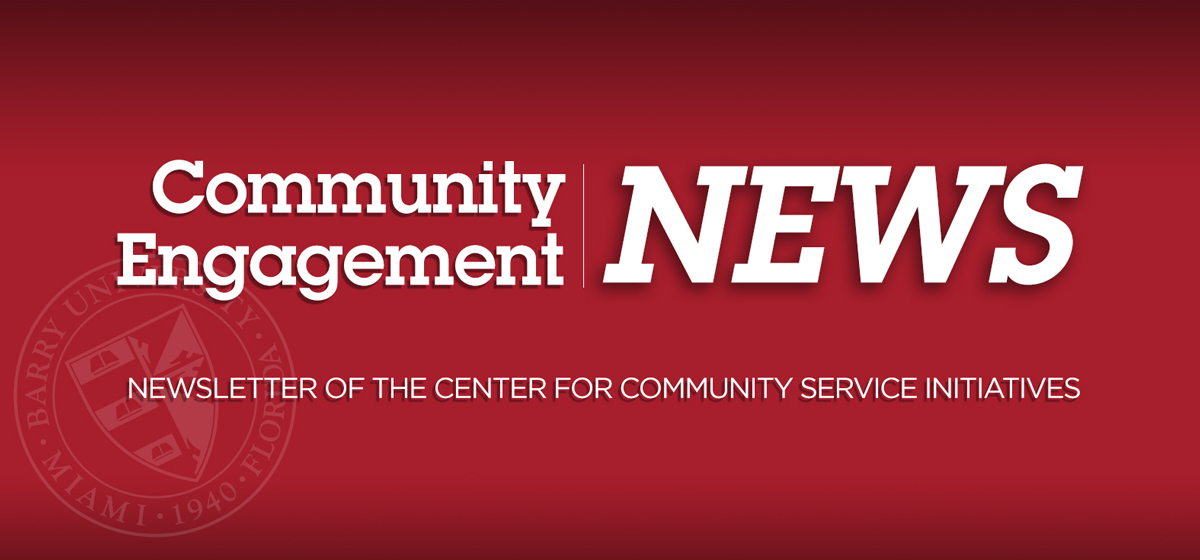October 12, 2020
IN THIS ISSUE
- Campus Democracy Project Promoting Democratic Engagement, Voter Turnout
- Seventh Annual Symposium on Academic Year’s Community Engagement Calendar
- CCSI Issues Early Call for Nominations for Eighth Annual Community Engagement Awards
- Faculty Learning Community for Engaged Scholarship to Meet November 5
- Bread for the World’s Racial Wealth Gap Simulation Takes Place This Saturday
Campus Democracy Project Promoting Democratic Engagement, Voter Turnout
Committee Expecting Voting Rate Increase
By Glenn Bowen

The National Study of Learning, Voting, and Engagement (NSLVE) found that 58.4% of registered Barry students voted in the mid-term election of 2018.
As part of Barry’s Campus Democracy Project (CDP), students have been given increased opportunities for democratic engagement and the motivation to turn out at the polls. From forums emphasizing what’s at stake to political debate watch events, the opportunities have intensified since last month.
Last week was National Voter Education Week. On Thursday, the CDP Committee hosted the Florida 2020 Ballot Forum to help students and other voters make informed choices in the upcoming elections. The forum put the spotlight on six proposed amendments to the Florida Constitution.
Among the proposed amendments is the $15 Minimum Wage Initiative (Amendment 2), aimed at incrementally increasing the state minimum wage from $8.56 in 2020 to $15.00 in 2026. Another is Amendment 4, which would require constitutional amendments to be approved by voters at two successive general elections to become effective. Currently in Florida, if voters approve an amendment at one general election, it becomes part of the constitution.
At the Ballot Forum, Ricardo “Rick” Ibarria, a political activist associated with Rise Up Florida!, a grassroots group, outlined the proposed constitutional amendments. He identified organizations that support or oppose each amendment and fielded questions regarding the pros and cons.
The CDP is a nonpartisan project of the Center for Community Service Initiatives (CCSI), designed to promote civic learning and democratic engagement through voter registration, education, and mobilization.
Barry Student Voting Rates
In the midterm election of 2018, 43.7% of eligible Barry students and 58.4% of registered Barry students voted, a study found. Among the university’s students, nearly 75% of those eligible to vote actually registered to vote.
The National Study of Learning, Voting, and Engagement (NSLVE) found lower rates of voting in 2018 compared to voting in 2016, a presidential election year. NSLVE is a major initiative of the Institute for Democracy and Higher Education at Tufts University’s Jonathan M. Tisch College of Civic Life.
“Barry students voted at rates higher than the national student average in both 2016 and 2018,” noted Dr. Sean Foreman, professor of political science and a co-chair of the CDP Committee. “While a slightly higher percentage of Barry students were registered to vote in 2012 than in the 2016 presidential election, the overall voting rate of registered students was higher in 2016. That indicates an increased conversion of registered voters that became actual voters in the election.”
Foreman added: “A similar phenomenon occurred between the 2014 and 2018 midterm elections. While the percentage of students registered to vote was roughly the same, the voter turnout rate of registered students was robust in 2018. The overall voting rates were lower in the 2018 midterm election than in 2016 as more voters overall turn out in presidential election years. Through sustained and more structured activities, we are expecting to see a higher voting rate among Barry students in 2020.”
About the Campus Democracy Project


The Campus Democracy Project (CDP) promotes voter registration, education, and mobilization. BucsVote is the student-initiated element of the CDP. Isaly Ortiz, a fellow in the Barry Service Corps, co-chairs the CDP Committee with Dr. Sean Foreman, professor of political science. The committee is composed of 20 members—students, faculty, and staff drawn from Academic Affairs, including every school and college; Mission and Student Engagement; and Business and Finance.
Last Wednesday night, about 35 students, faculty, and staff members attended the CDP’s Vice-Presidential Debate Watch. The following morning, a small group got together online to discuss the debate between Senator Kamala Harris, the Democratic Party candidate, and Vice President Mike Pence, the Republican candidate.
On September 29, the CDP Committee hosted the First Presidential Debate Watch, followed by a discussion the next day. The Second Presidential Debate Watch was on the schedule for this Thursday (October 15) with a follow-up discussion on Friday. And the Third Presidential Debate Watch was set for October 22, with an hour-long discussion the next afternoon, beginning at 2 o’clock.
Graduate student Mateo Gomez was expected to moderate the October 16 discussion from noon to 1 p.m.
Gomez got to ask a question during the NBC Nightly News “Decision 2020” Town Hall with Democratic Party presidential candidate Joe Biden last Monday (October 5). The event was held at Pérez Art Museum, downtown Miami, in front of a physically distanced audience of undecided Florida voters, Gomez being one of them.

Barry MBA student Mateo Gomez asks a question during a televised town hall featuring former Vice President Joe Biden in Miami.
Introduced by NBC News anchor Lester Holt as a “first-time voter,” Gomez, 22, asked Biden: “If you win in November, there will be a 56-year age gap between you and myself. My generation, Generation Z, is growing up with school shootings, police brutality, and protest and the inability to earn a livable wage even when you hold an advanced degree. … How can someone like yourself, an older White male, represent my generation over the next four years? And … can you guarantee me the American Dream still exists?”
“I guarantee it,” Biden, 77, responded, adding that “with age comes wisdom.” He said he would, among other things, cut student debt and provide tax credit for first-time home buyers.
National Voter Registration Day
In September, the CDP Committee hosted a National Voter Registration Day event with Barry alumna Dominique McMillan as guest. The former Barry Service Corps Fellow is now the program coordinator for ALL IN Campus Democracy Challenge.
McMillan noted that young people, many attending high school, were “ready to make [social] change,” although they had not reached the voting age. She emphasized the need for citizens to seek solutions to problems not by looking to the president or to Congress but by turning to local government.
“You should bring your problems to people who are paid to work for you” at the local level, McMillan said at the September 22 event. She urged prospective voters to follow state rules regarding voting by mail and, alternatively, to use drop boxes “if that works better.”
ALL IN is a “national, nonpartisan initiative [that] inspires, supports, and celebrates colleges and universities working to improve civic learning, political engagement, and voter participation.” The ALL IN program “empowers colleges and universities to achieve excellence in student democratic engagement.”
Barry has been participating in the ALL IN Challenge since 2018, the organizers note. Students are urged to take the pledge to vote.
Voter Guide on Issues and Positions
As Americans prepare to vote, the Campus Election Engagement Project (CEEP) has provided a voter guide for students, focused on issues and positions taken by the two nominees for U.S. president. Issues covered in the guide include the Affordable Care Act, climate change, courts, COVID-19, gun control, immigration, and social security.
“Nonpartisan Candidate Guide: United States President” is available in both English and Spanish.
CEEP is a national, nonpartisan project that helps administrators, faculty, staff, and student leaders at U.S. institutions of higher education engage students in federal, state, and local elections. Through CEEP, colleges and universities are “working to promote a more equitable and inclusive democracy, and to overcome the ever-changing barriers to voting.”
The CDP is implemented with support from CEEP, the Students Learn Students Vote Coalition (SLSV), Ask Every Student, and ALL IN.

The CDP is implemented with support from the Campus Election Engagement Project, the Students Learn Students Vote Coalition, Ask Every Student, and the ALL IN Campus Democracy Challenge.
SLSV calls itself “the national hub and largest nonpartisan network in the United States dedicated to increasing college student voter participation.”
Ask Every Student is “a nonpartisan program for higher education institutions to scale, apply, and implement voter registration strategies that reach every student on campus.” Program organizers say they “understand that whether we’re operating in digital or physical space, we can still find ways to ask every student about participating in the democratic process.”
Barry is taking part in the Ask Every Student program as one of the Commitment Campuses for 2020–2021.
Students are reminded that October 24, Vote Early Day, is the last day to request a vote-by-mail ballot in Florida for the November 3 election.
On November 11, from noon to 2 p.m., a roundtable on women in politics will take place. Billed as “A Vote of Her Own,” the event will include the announcement of Barry’s Pi Sigma Alpha Essay Contest results.
On the CDP calendar, as well, is Campus Ministry’s Snack and Chat titled “Blacks Voters, Faith, and Politics.” That event is slated for 1–2:30 p.m. on November 18.
Seventh Annual Symposium On Academic Year’s Community Engagement Calendar

Barry’s seventh annual Community Engagement Symposium is on this academic year’s community engagement calendar. The event is scheduled for March 31, and a call for proposals will be issued next month.
“Engagement in Purposeful projects: From Awareness to Action” is the theme of the symposium. This premier event will provide an opportunity for presentations on the outcomes of community-engaged courses and projects.
The symposium is expected to feature a nationally recognized community engagement scholar as the lead presenter. Students, faculty and staff members, and community partners also will make presentations.
A student poster competition for undergraduates will be a highlight of the symposium. Several prizes will be presented, the organizers say.
The seventh annual Community Engagement Symposium, which was scheduled for March 25, 2020, was cancelled in the wake of the coronavirus pandemic. The organizers say the 2021 event will be held remotely if restrictions on in-person gatherings remain in effect.
Members of the 2019–2020 Symposium Committee were Dr. Sheila McMahon, proposal review chair; Dr. Sean Erwin; Dr. Ricardo Jimenez; Dr. Celeste Landeros; Dr. Raul Machuca; Luca McLeod; Dr. Maria Teahan; and selected CCSI staff members.
For information on the student poster competition, contact Dr. Heather Johnson Desiral, project assistant for the Quality Enhancement Plan (QEP), at qep@barry.edu.
CCSI Issues Early Call For Nominations For Eighth Annual Community Engagement Awards

The eighth annual Community Engagement Awards is scheduled for March 31, 2021. Among the 2020 award winners are Pa Sheikh Ngom and Martina Muñoz Chalan.
The Center for Community Service Initiatives (CCSI) has issued an early call for nominations for the 2021 Community Engagement Awards. Students, faculty, and staff members, as well as community partners, are invited to submit nominations by January 29.
Nominations are being accepted in seven categories: Community Impact, Community Partnership, Community-Based Research, Community-Engaged Scholarship, Community Engagement Educator, Service-Learning Faculty, and Engaged Department.
The 2020 award winners in the Community Impact category include Martina Muñoz Chalan and Pa Sheikh Ngom. Muñoz Chalan assisted the Atelye Thevenet Artisan Cooperative in northwestern Haiti, managing its business and accounting processes while Ngom made significant contributions to environmental sustainability and food security initiatives.
Members of the 2019–2020 Awards Committee were Dr. Stephanie Bingham, chair; Dr. Pamela D. Hall; Ms. Andrea Ivory (community partner); Dr. Kevin Kemerer; Paola Lopez-Hernandez; Dr. Fabio Naranjo; Dr. Lauren Shure; and Dr. Glenn A. Bowen (ex officio).
The CCSI will host Barry’s eighth annual Community Engagement Awards on March 31, from 6:00 to 7:30 p.m. It is likely that the 2021 event will be held remotely, the organizers say.
The nomination forms are available at the CCSI website. For additional information, contact the CCSI at service@barry.edu.
Faculty Learning Community For Engaged Scholarship To Meet November 5
The Faculty Learning Community for Engaged Scholarship (FLC) will have first meeting for the academic year, including an Engaged Scholarship Seminar, on November 5 from noon to 2:00 p.m.
The FLC facilitates professional development and reflective practice in community-engaged teaching, research, and service. Organized by the CCSI, the FLC is open to all faculty members.
All FLC members and prospective members are urged to attend the November 5 meeting, which will be held remotely.
For additional information on the FLC, contact any of the facilitators— Drs. Laura Finley, Pamela Hall, and Celeste Landeros—or the CCSI.
Bread For The World’s Racial Wealth Gap Simulation Takes Place This Saturday

Bread for the World says the simulation helps people understand the connections among racial equity, hunger, poverty, and wealth.
Bread for the World will present its Racial Wealth Gap Simulation this Saturday, October 17, for the benefit of Barry students, faculty, and staff.
“The simulation is an interactive tool that helps people understand the connections among racial equity, hunger, poverty, and wealth,” Bread for the World says. “It is a good first step for people unaware of structural inequality, a support tool for those who want a deeper understanding of structural inequality, and a source of information for experts who want to know the quantifiable economic impact of each policy that has widened today’s racial hunger, income, and wealth divides.”
Florence French Fagan, a Bread for the World regional organizer, will be the lead facilitator of the simulation.
In the simulation, participants will learn how federal policies created structural inequalities, such as in the area of education—and how those policies increase hunger and poverty in communities of color. French Fagan is expected to guide participants to an understanding of why racial equity is so important to ending hunger and poverty in the United States.
Saturday’s event is scheduled for 11:00 a.m. to 1:00 p.m. Registration is required. For additional information, contact CCSI Program Facilitator Kaitlyn Gallagher at kgallagher@barry.edu.

11300 NE 2nd Avenue
Adrian 208
Miami Shores, FL 33161
service@barry.edu | 305 899 3696

